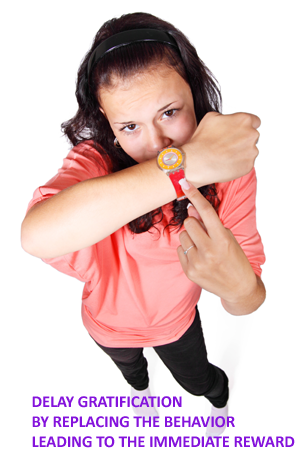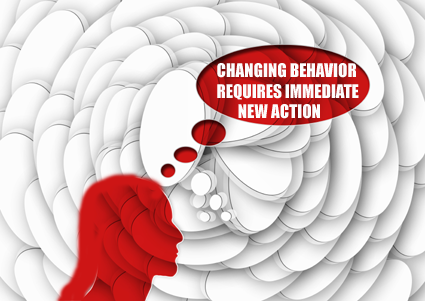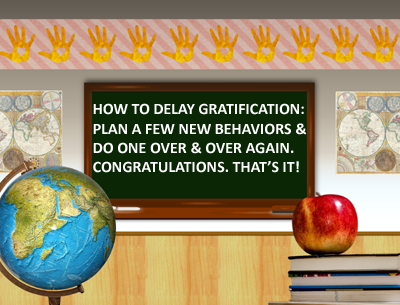When We Delay Gratification…
WHEN WE DELAY GRATIFICATION…
(ISSUE 132) JUNE 10, 2014
By Diane Gold
 When we delay gratification, we use one skill which allows self-control: we replace the behavior that would have led us to the immediate reward. Whether we are young children or adults, it is the same strategy. Whether we can throw ourselves deeply enough into a new activity to control our behavior is different for everyone.
When we delay gratification, we use one skill which allows self-control: we replace the behavior that would have led us to the immediate reward. Whether we are young children or adults, it is the same strategy. Whether we can throw ourselves deeply enough into a new activity to control our behavior is different for everyone.
When we are adults, we can reason a little more easily than when we are kids; but the ease of control may be the same. Our discussion, here. will slant toward the cravings that occur in people whose urges make it impossible to delay gratification without habit replacement rather than those who can delay at will for fuller satisfaction.
Some people may say, why delay? Let’s have fun; no need to wait. We each make choices about when to hold off on receiving a reward, often based on whether the reward is good for our lives. Take the example of love making. Some people will want to rush to receive a reward, and some will want to savor the act for a long time. Or another example is drinking alcohol. Some people will want to savor the great taste, and other people will hurry to finish one drink to compound the psychoactive results effects of alcohol with the next drink.
Always a factor is whether someone has the personal discipline necessary to delay gratification and whether not delaying will harm us. Some people have the self-control. Some people need to create it through hard work and continual effort.
MARATHON TV EPISODES CAUSE THE SAME HORMONAL CRAVINGS AS ALCOHOL

I was reading a current article about the way certain online TV and movie providers supply a full season of one show , aka, marathon TV episodes, as opposed to week by week content, and the delay of gratification issue came up. Some of us look forward to setting up our schedule around a schedule that entertainment companies created for what they envisioned as the most profit. Others of us prefer to view a season of TV as one longer movie available all at once. (TV episodes shall refer here to entertainment that can be viewed on a TV or other media device.)
I was reading a current article about the way certain online TV and movie providers supply a full season of one show , aka, marathon TV episodes, as opposed to week by week content, and the delay of gratification issue came up. Some of us look forward to setting up our schedule around a schedule that entertainment companies created for what they envisioned as the most profit. Others of us prefer to view a season of TV as one longer movie available all at once. (TV episodes shall refer here to entertainment that can be viewed on a TV or other media device.)
The craving to watch a season of a single TV series all at once instead of once a week creates the same urgency for some people as anticipating the taste of a favorite cake or the initial effects of alcohol. This may seem highly unlikely to occur. But, I guarantee I experience this type of craving. Having the ability to choose my viewing preferences, that is, once a week or all at once, brings out this urge I know so well. I always choose to watch all of a series at one time. And I am compelled to continue watching.
Watching TV or cable episodes may not seem like a harmful habit. However, what would happen if there were 10 seasons of episodes to watch and I kept watching them without doing my work? That would be problematic. And so it happens that I have to curb my behavior in a similar way as I curb alcohol, food or drugs.

This urgency to continue watching these episodes requires immediate new action in order to replace the behavior or watching the episodes with my work. The optimum word is IMMEDIATE. That is the trick.
Which takes me to talk about a strategy to delay gratification I read about in a book. The book is fiction, but the strategy is brilliant.
HAVING AN IMMEDIATE SUPPORT SYSTEM TO DELAY GRATIFICATION
I just finished Robin Cook’s latest novel which is all about a phone app’s replacing the primary care doctor. Currently, we can measure our heartbeat by downloading a free app. Tomorrow, maybe we will have an app that acts to measure all our vital signs by our grip on the phone or a drop of our spit on the screen. Hopefully, there will be enough transparent monitoring so that the app can’t hijack our bodies. (The book was quite impressive as Robin Cook, an MD, himself, is vividly creative about how problems can occur should we turn over part of our healthcare to an artificially intelligent doctor, built to learn as it goes. What if it doesn’t learn the value of human life?)
One of the functions of the app doctor in the book briefly mentions the benefit of having an immediate medical doctor with whom to speak 24 hours a day, 7 days a week. This brings up the immediate support system need for cravers, aka, people who cannot control their passions, to have an instant intervention directed at them. This fictitious app doctor could be modified into an actual real app for emotional issues, especially with the urge behaviors.
When the craver grips the phone too tightly, or when the heart rate increases in a certain way or when hormonal changes – which are similar every time – appear; this often would indicate that urge behavior was present. The support app could then suggest a set of behaviors to replace the one we want to replace. By a support system’s being in place, the craver can execute the new behavior and get into a new, more beneficial habit.
THE DOWNFALL WITH HABITS AKA NOT BEING ABLE TO DELAY GRATIFICATION
 The biggest downfall in the ability to delay gratification happens in the first 10 to 30 seconds after we have an urge: we haven’t planned for our replacement behavior or we need a cheerleading team to provoke our behavior change and don’t have one. We have ourselves. Of course, the goal is for us to create this gallery of cheerers within ourselves so that we can do what is best for our lives, immaterial of what our hormones tell us to do. This may take time.
The biggest downfall in the ability to delay gratification happens in the first 10 to 30 seconds after we have an urge: we haven’t planned for our replacement behavior or we need a cheerleading team to provoke our behavior change and don’t have one. We have ourselves. Of course, the goal is for us to create this gallery of cheerers within ourselves so that we can do what is best for our lives, immaterial of what our hormones tell us to do. This may take time.
What if there were a phone application that would immediately tell us a choice behavior to do to take us in the completely opposite direction from the craving behavior? A cheerleading app specifically for cravings. Wow! Until then, we plan and use the plan. Until such time as we have consistent success with doing our new behavior and stepping away from our old, we can work! After we have success, we will have to work, too.
THE MARSHMALLOW STUDY
In the late 1960s-early 1970s, at Stanford University, Walter Mischel did several famous studies published in The Journal Of Personal And Social Psychology, where he put a cookie, marshmallow or pretzel in front of 600 young children. He gave them a choice of eating the food immediately or waiting for him to walk out of the room on an errand and come back; those who waited would get an extra cookie, marshmallow or pretzel. He learned, through this and follow up studies 20 and 30 years later that the children who waited for the extra prize had higher SAT scores, were more likely to finish college and had seemingly happier lives.
CONCLUSION
This leads us to ponder whether the delay of gratification can be taught since there are indicators that control in gratification leads to more success.
To some people, no matter how long they have been in a teaching program to learn restraint, it is always difficult. They will have the urge to revert to their old lack of control behavior in a flash. There are fancy names for this, but I prefer to keep it simple and lead to action steps.
Delaying gratification builds foundation and may require replacement of behavior. This is true. However, it does not work the same in each person. Some people can turn their backs on playing the slot machine one more time or on drinking one more drink of alcohol or watching one more episode in a TV marathon. Others have to go through a tedious process on an ongoing basis in order to continue the behavior replacement.
Many techniques of delaying reward teach that we need to look at a variety of things. Then we can build our characters because we want quality of life through many changes. It’s important to consider that people are different and must be treated as such.

My technique of teaching delay of reward is simple: plan a few new behaviors and do one over and over again. Congratulations. That’s it.
ACTION STEPS
Here are some action steps for working to delay gratification. They can be used by anyone.
1) Plan ahead only as far as the next time we get an urge we want to delay (or put into dormancy). The plan would require, at least, 3 behaviors to execute within 10 to 30 seconds of the urge such as:
a) Drink two 12 ounce glasses of room temperature water.
b) Run around the house, office building, office bathroom if you can’t leave, for 5 to 10 minutes.
c) Go into the bathroom and jump up and down for 30 seconds. Rest. If you are not feeling sick, do it again. Rest. If you are not feeling sick, do it again. If you feel sick after the first or second set of 30 seconds, walk in place instead.
d) Run in the opposite direction from the one you want to get away from for a full minute. If you can continue, go for 4 more minutes.
e) Speak to a person or to the coming soon non-fiction supportive cheerleading team app on your phone.
2) Stop thinking anything judgmental about yourself. You are too busy doing one of the planned steps in 1) right now.
3) Resist the urge to celebrate your success. Once you have had 1000 successes, know that once a habit, always a habit. So what you have succeeded in changing 1000 X is within you and requires diligence on an ongoing basis to keep it dormant. Be cautious not to think you have changed for good, since the work is ongoing.
4) Enjoy the journey. There is light after a while.
5) Whether you are a craver or find it easy to delay gratification, show understanding to everyone with regard to this issue.
![]()
If you wish to share your story, please hit reply in your email program to be contacted.
![]()
FEEDBACK
We value your feedback very much.
Please leave a comment.
Please LIKE us on the website and at
WarriorsOfWeight on Facebook.
You can also follow us on Twitter @warriorsoweight.
Thanks.
![]()
DIANE GOLD, PUBLISHER AND AUTHOR
Diane Gold, Founder of Warriors of Weight, Turning Habits Into Health, is a mentor in tai chi, kung fu and meditation, a music, fitness and stress expert, dedicated mom, studying plant-based nutrition and habit change.
She is very interested in expressing how it feels to delay gratification. She says,
“Many people find it easy to hold off on giving themselves a reward. Then, there are others who can wait with great effort, or sometimes, not at all. For those who delay, sometimes there is extra pleasure at the end. For those who do not, sometimes there is out-of-control painful outcome as a result.
“It’s important to know that, with a tiny plan, anyone can begin to charm this process: if only by replacing the original action that rewards us with something else. Analyzing our desires is not as helpful as taking a new action. Thinking about how we compare to the rest of the world in self-control is not as helpful as taking a new action. Blaming ourselves for the last time we did not delay gratification that harmed our life never helps. Focusing on our new action does.
“With repetition, we can get used to taking a new action no matter how many times we have taken the same, old one in the past. Take one new step, and take it again.
“Finally, let us all take good care of ourselves because we are so worth it!”
![]()







